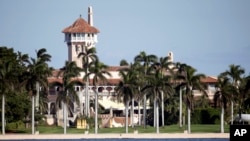President Donald Trump made seven trips to his Mar-a-Lago resort in Florida earlier this year, and the public might soon get a look at who else was there with him.
The Department of Homeland Security has agreed to hand over records related to the property's visitors in September. The move comes in response to a lawsuit filed by Citizens for Responsibility and Ethics in Washington, the National Security Archive and the Knight First Amendment Institute at Columbia University.
Those organizations have been seeking information about visitors to Mar-a-Lago, Trump Tower and the White House. Trump has not traveled to his New York City office tower since being inaugurated; he visited the Florida property — which he dubbed the "Winter White House" — throughout February, March and April.
Homeland Security oversees the Secret Service, the agency charged with protecting the president.
Spokespeople for the department and the agency declined to comment, citing the pending litigation.
DHS said in response to the lawsuit that it has no records about Trump Tower. CREW officials say they have no idea what kind of information DHS will share about Mar-a-Lago, but the liberal-funded government watchdog said it will make public whatever it receives.
The federal judge overseeing the case ordered late last week that the administration "complete its search for and processing of responsive 'records of presidential visitors at Mar-a-Lago,' and produce any non-exempt responsive records" by Sept. 8, according to court documents.
"We are glad that as a result of this case, this information will become public for meetings at his personal residences, but it needs to be public for meetings at the White House as well," CREW executive director Noah Bookbinder said in a statement.
The Trump administration doesn't release names of White House visitors. President Barack Obama made public White House visitor logs beginning in September 2009, after four lawsuits by CREW. Obama released the records within four months of each visitor's White House appearance.
Transparency advocates, including conservative legal advocacy group Judicial Watch, say that the Trump administration should allow the Secret Service to release the logs under the Freedom of Information Act.
The White House argues the records are exempt from the law.
